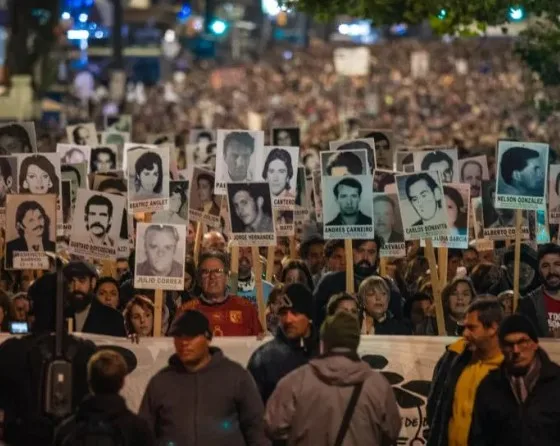Legislation in Uruguay to allow some dictatorship criminals out of prison stirs strong passions
By Grace Livingstone
Senators passed the legislation which — if approved by the lower house of congress — will allow criminals over the age of 65 to be released from prison into house arrest. Organisations representing victims of the dictatorship describe the bill as “a big step backwards”.
Patricia López of the Association of Mothers and Relatives of Uruguayan Disappeared Persons calls it “morally unacceptable”. “We have seen so little justice for victims of the dictatorship, and this law is a big setback,” she says.

Relatives of the “disappeared” in Uruguay have demanded for years that the military provide information about what happened to them.
Supporters of the law say the “humanitarian measure” will benefit not just those over the age of 65, but also mothers and pregnant women who are currently in jail.
Carmen Asiaín is one of the senators who voted in favour of the bill. She says lawmakers were “careful to abide by international human rights conventions and not to create situations of impunity”.
Under the proposed law, the senator from the governing National Party notes, convicts over the age of 65 may only serve out their sentence under house arrest if a judge agrees that their physical or mental health is so poor that staying in prison would affect their “human dignity”.
While those found guilty of crimes against humanity are excluded from the measure, human rights activists point out that most convicted Uruguayan officers were found guilty of lesser offences such as homicide or personal injury, and therefore could be released from jail if the bill is passed.
Thousands of people were tortured and 197 people were forcibly disappeared under Uruguay’s military regime, according to Uruguayan government figures. A further 202 were victims of extra-judicial killings between 1968 and 1985.
Human rights NGO Observatorio Luz Ibarburu and Francesca Lessa, an academic at University College London, have spent years collecting data on the crimes committed during Uruguay’s 12-year dictatorship and followed attempts to bring those responsible to justice.
Uruguay returned to democracy in 1985, but an immunity law granting amnesties to members of the armed forces accused of human rights violations was in force until 2011.
To date, only 28 people have been convicted of dictatorship-era abuses.
Pablo Chargoñia of Observatorio Luz Ibarburu says that the proposed legislation could lead to the few officers that have been convicted being sent home.
Time is also against those trying to investigate the dictatorship-era crimes. The coup that ushered in the military regime took place 50 years ago and many of those involved died before they could be prosecuted, explains Mr Chargoñia.
Besides trying to prosecute perpetrators, rights groups are trying to find out what happened to the “disappeared”, people who were kidnapped by the military regime.
They have called on the Uruguayan armed forces to release information about their whereabouts. But so far, of the 197 Uruguayans who were forcibly disappeared, the remains of only 31 have been found.
The search is complicated by the fact that many were victims of a secret plan called Operation Condor, in which the dictatorships of Argentina, Bolivia, Brazil, Chile, Paraguay and Uruguay worked together to track down their opponents across borders.
Twenty-five of the 31 bodies were found in Argentina, showing the extent to which the two neighbouring countries’ dictatorships collaborated.
While most of those disappeared by the military decades ago are presumed dead, survivors of Operation Condor have been able to provide information about how the military regimes operated.
Sara Méndez is one of them. In the 1970s, the Uruguayan left-wing activist and teacher was living in exile in the Argentine capital, Buenos Aires.
On 13 July 1976, she was kidnapped in a joint operation by the Uruguayan and Argentine armed forces. As armed men hustled her blindfolded into a car, they left her three-week old baby behind, sleeping in a wicker basket.
Sara was taken to a secret torture house in Buenos Aires, before being sent back to Uruguay where she was imprisoned for five years.
She spent the next 25 years searching for her son, Aníbal Mendez, before finally finding him in 2002 in Argentina. Aníbal had been adopted by a police commander in Buenos Aires and knew nothing of this sinister past.
When Aníbal was 25 years old, the man he thought was his father told him he was adopted: “He said that a baby had been abandoned at a local clinic. His wife thought the baby was so beautiful, they decided to adopt him.”
“I listened to his version, but I didn’t believe it,” the now-47-year-old Aníbal says.
Aníbal agreed to take a DNA test, which confirmed he was Sara’s son. He and Sara have spent the last 20 years building a relationship.
“At the beginning it was very difficult. Imagine, a person that didn’t raise you, that you’ve only just met, but you know she is your biological mother, this was something we had to overcome,” he explains.
Aníbal has also had to grapple with his conflicting feelings for the couple who raised him: “I am very clear that these two people who brought me up committed this terrible crime of taking a baby and changing its identity. But I grew up with their love and I am not going to erase this love they gave me or the love I also felt for them.”
Sara says that reconnecting with her son “took many years of work”.
Of the estimated 500 babies taken in Argentina from women political detainees like Sara during the dictatorship, 133 children have been reunited with their birth families.
But the baby thefts have left a legacy of complex trauma.
‘I think that the stealing of babies was one of the cruellest things these dictatorships did – the taking of a child by people who formed part of a repressive apparatus that persecuted, tortured and killed their parents,” Sara says.
She is concerned that the proposed law currently winding its way through Congress “doesn’t distinguish between common crimes and crimes committed by the state”.
She also thinks the bill “does not consider the victim’s opinion when it comes to deciding any modification of the prison regime for convicted officers”.
Three retired military officers and one policeman are currently serving sentences in Uruguay in connection with the kidnap and torture of Sara Méndez.
One of them has already been released into house arrest. If this bill is passed the others could also serve out their sentences at home.
_________________
Credit: BBC





















